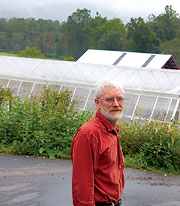
photos by Jonathan Welch
|
It was a cold day in Staffordshire, England. The sleet was blowing horizontally across the field, and apprentice farmer Ian Robertson suddenly realized his hands were freezing and his knees were stuck to the burlap sack he’d been kneeling on. “I realized I could be doing this [sizing and bagging potatoes] for the rest of my life,” he says.
“After I got my joints moving and I was running down to the gate, before I got there I stopped,” he recalls. ” I thought, ‘If I open this gate, where am I going? If this was a career move, and the gate was a first step, where would I go?’ The answer was, ‘I have no idea.’ So I thought, ‘OK, I’ll go back up there and as I’m sorting these potatoes out, I’ll ask those questions and see if I can’t, by the end of the day, have some answers.'”
That was in 1966, and Robertson hasn’t stopped asking questions since. But these days, a lot of them are directed toward students at Warren Wilson College, where Robertson holds the unusual title of dean of work. Students there must put in three hours a day on one of the school’s more than 100 work crews to help offset the cost of room and board. And while most people don’t approach work as an avenue for philosphical reflection, that’s exactly what Robertson encourages his students to do, he explains in his warm English accent. “We ask people to reflect upon work. We ask them to ask deep questions about it.”
Robertson’s own motley livelihood path seems to have prepared him well for his current position, though this was hardly apparent at the time. Ironically, however, Robertson says he’s never done much career planning himself. “In many cases opportunities have presented themselves, and I felt I had something to offer,” he says simply.
Indeed, his life seems to exemplify the Danish philosopher Soren Kierkegaard’s observation to the effect that “life must be lived forward but can only be understood backward.”
Pajama Man
The first person Robertson remembers having a real impact on his thinking about work was Pajama Man. A Chinese refugee who’d come over from the mainland during the communist revolution, Pajama Man (whose clothes looked like sleepwear) inhabited a cavelike space underneath the parking deck attached to the Hong Kong apartment building where Robertson lived from age 13 to 16.
“I used to go down there and particularly watch him cook and prepare meals,” recalls Robertson, whose father was a wireless operator for the British armed forces. “He didn’t speak very much English, and I only limited Cantonese, but he seemed to tolerate me just kind of squatting down and being there.”
Pajama Man’s home was made of cardboard boxes. He smoked tobacco in a water pipe, and other refugees would come over to play mahjong and tell “stories in a language I didn’t know or understand,” Robertson remembers.
Pajama Man made his living washing and keeping an eye on the cars parked in the deck above him, which cantilevered off a steep mountainside. To conserve precious charcoal, he would cook all his food for the day in a big wok first thing in the morning.
“I learned a lot,” says Robinson. “Here was someone who was resourceful, who was caught in a situation that didn’t give him many options. But he was inventive; he’d use what was available. There were never a lot of things there, but there was always a sense of contentment.”
Potato-hog epiphany
After returning to England, Robertson found himself at loose ends. Eventually his father took him to a career counselor who, based on the young man’s love of the outdoors, suggested farming.
A year later, Robertson had his fateful encounter with the “potato hog” (a dirt-and-straw spud shelter). And the answer to the questions he asked himself that day was that he needed to go back to school to learn more about his chosen profession.
Robertson spent three years — two as a student and one as assistant pig manager — at Staffordshire College of Agriculture, an experiential school with work crews not unlike those at Warren Wilson.
In 1969, however, the restless young man applied to the Voluntary Service Overseas (Britain’s nongovernmental answer to the Peace Corps) and was shipped to a school in a remote area in the southern Philippines.



Before you comment
The comments section is here to provide a platform for civil dialogue on the issues we face together as a local community. Xpress is committed to offering this platform for all voices, but when the tone of the discussion gets nasty or strays off topic, we believe many people choose not to participate. Xpress editors are determined to moderate comments to ensure a constructive interchange is maintained. All comments judged not to be in keeping with the spirit of civil discourse will be removed and repeat violators will be banned. See here for our terms of service. Thank you for being part of this effort to promote respectful discussion.